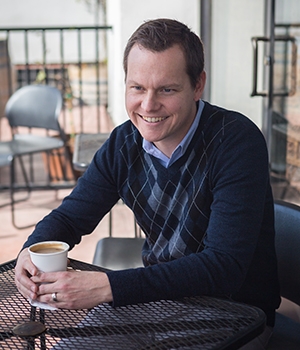Illness, Curiosity Drive Professor’s Research Into Immunology

Note: This issue of Panorama features a profile of Professor Kirk Jensen, which originally appeared in the Spring 2016 issue of UC Merced Magazine.
Professor Kirk Jensen might never have landed at UC Merced if not for two unhappy accidents.
The first came while he was a high school student in Orange County with a scholarship offer to study physical therapy at Pepperdine University. He mailed his letter of intent the weekend before the deadline, but it didn’t get postmarked, and thus ended his career as a physical therapist.
Two years later, just before transferring from a community college to UC San Diego, Jensen contracted malaria during a vacation to South America — despite having taken prophylactic medications that should have prevented it.
“I was violently sick,” he said. “I had the most dangerous kind of malaria — the kind that attaches to the tissue separating your blood from your brain. First it hangs out in your liver for two or three weeks before jumping to your blood, and that’s when you start having crazy symptoms — violent shaking, cramping, aching, sweating. I experienced a headache of epic proportion that I’ve never felt before or since. The parasite was causing severe inflammation in my brain. I couldn’t think. Breathing hurt.”
“That’s the first wave. Then it kicks in again three days later, and these infectious waves continue on and off indefinitely. I could see how even at the most physically fit point in my life, I could lose it and not be able to kick this thing.”
The experience left its mark. He began studying biology at UC San Diego and planned to become a community college teacher, but later that year he landed in an immunology lab, and his curiosity got the better of him.
“Contracting malaria prodded a lot of interesting questions I had about the immune system,” he said. “Why did the drugs not work? Why is there no vaccine? How does the immune system ultimately win a battle against a dangerous pathogen?”
Immune System on a Tightrope
Those questions have driven him ever since. The simple answer is that vaccines, which are so effective against diseases like polio, just can’t induce an immune response strong enough to combat malaria, HIV and many other dangerous infectious diseases.
These diseases are caused by pathogens that are especially virulent, and the immune system can only work so hard to kill them before it must shut down.
“The immune system kills the cells and tissue where a pathogen hides, and this is an effective strategy to combat many infections,” Jensen said. “However, at some point during an extreme infection, the immune system won’t respond anymore, for it fears causing extensive tissue damage.
“But if you reprogram the immune system correctly, you can get the response you need without the inflammatory damage. With immunotherapy, you can control when the immune cells turn on or off.”
For his Ph.D. dissertation, Jensen studied an obscure set of immune cells and provided a basic framework in which to understand them. That important work helped advance scientific knowledge of the immune system and inflammation, and it remains one of his most significant accomplishments.
More recently, Jensen has studied the Toxoplasma parasite, which he found can be more virulent than previously thought.
As each study provides more insight into how the immune system works, scientists get closer to figuring out how to prevent the immune system from shutting down its response to these parasites without putting the infected host in danger.
The use of immunotherapy in fighting cancer is already being thoroughly explored. Jensen hopes that approach will extend to pathogens as well, and the rapid advancement of gene engineering should only accelerate the research that will lead to such breakthroughs.
“With recent developments in gene engineering, we can deactivate every gene in an immune cell and run 100,000 experiments in one fell swoop,” he said. “Using this approach, we can see which genes are responsible for the shutdown of the immune cell during extreme infections.”
Long, Hard Journey Pays Off
Jensen took a scenic but prestigious route from San Diego to Merced, earning his Ph.D. at Stanford before spending six years as a postdoc at the Massachusetts Institute of Technology. All told, it was a full 15 years from his bachelor’s degree to his first job as a professor. He joined the School of Natural Sciences in 2014.
In addition to his research, Jensen has worked hard to build up his lab, which now includes two graduate students, three undergraduates and a technician. That means a lot of training and supervision, in addition to teaching classes, and he also handles admissions for UC Merced’s Quantitative and Systems Biology graduate group.
Outside of school, Jensen and his wife live in Merced with their three sons, ages 9, 5 and 2, and on most days he gets to spend some time with them before rushing to campus.
There might not be much time in his Jensen’s day for extracurricular activities, but he takes great pride in the growth of his family, his lab and his new campus.
“If you like institution building, there’s a lot of work to be done at all levels here,” he said. “That was part of the draw — we might actually do something really interesting, in addition to our science. We’re building a university of UC caliber.”
